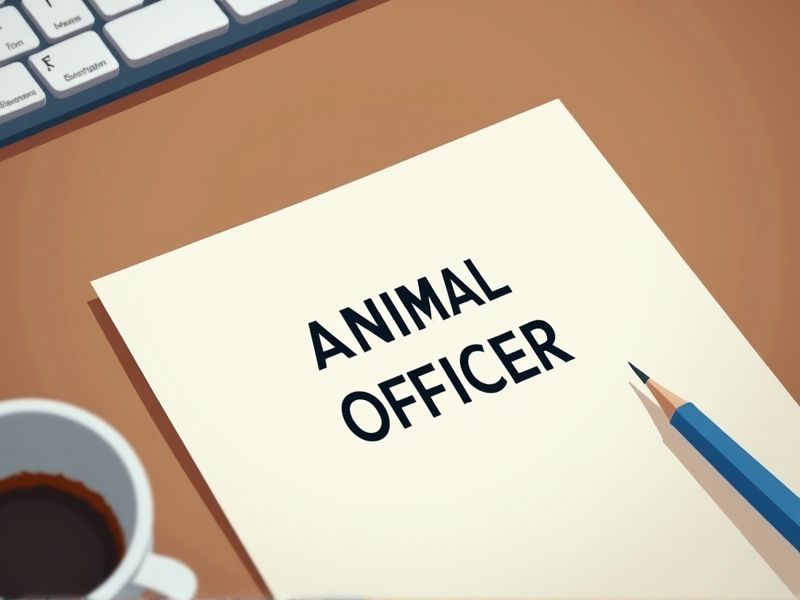
Animal Control Officers play a crucial role in public safety and animal welfare, necessitating specialized knowledge and skills. Certification ensures officers are well-equipped to handle diverse situations, ranging from animal rescue to managing potentially dangerous animals. It also enhances their understanding of animal behavior, aiding in more effective handling and resolution of incidents. Some important certifications you may need for an Animal Control Officer role include specialized training in animal handling and law enforcement.
State Certified Animal Control Officer Certification
State Certified Animal Control Officer Certification ensures officers have comprehensive training in handling animals safely and humanely. This certification establishes a standardized level of knowledge and skills, crucial for maintaining public safety and animal welfare. Legal requirements often mandate this certification to enforce animal-related laws effectively. Certification provides officers with the latest information and techniques, improving response efficiency in various scenarios.
Certified Animal Welfare Specialist (CAWS)
The presence of a Certified Animal Welfare Specialist (CAWS) enhances the expertise of an Animal Control Officer by ensuring they apply the latest humane practices and welfare standards. As animal welfare regulations grow increasingly complex, the structured knowledge provided by a CAWS certification helps navigate these legislative intricacies. Handling animals requires not just physical management but also a deep understanding of psychological and behavioral needs, which CAWS education provides. Having CAWS-certified officers can increase community trust by demonstrating a commitment to ethical treatment and informed care for animals.
Certified Wildlife Rehabilitator Certification
The Certified Wildlife Rehabilitator Certification equips Animal Control Officers with specialized skills to handle and care for injured or orphaned wildlife effectively. With this certification, officers are more adept at distinguishing between animals that require intervention and those better left in their natural habitats. This certification ensures adherence to best practices in wildlife rehabilitation, reducing unintentional harm caused by improper handling. Proper training enhances public trust in animal control services by demonstrating a commitment to wildlife welfare and ethical standards.
Pet First Aid & CPR Certification
Animal Control Officers frequently encounter injured animals, and CPR certification equips them with the skills to provide immediate life-saving care. In cases of emergencies, having training in pet first aid can significantly increase an animal's chances of survival. Officers often handle a variety of animals, and this certification ensures they can respond appropriately to different species. By being certified, they demonstrate a commitment to animal welfare and responsible care practices.
Animal Behavior and Welfare Training Certification
Animal Behavior and Welfare Training Certification equips animal control officers with the necessary skills to assess and handle animals safely and humanely, reducing the risk of injury to both the officers and animals. Training ensures officers understand animal communication cues, which can prevent conflict and facilitate safe capture techniques. Certification addresses the psychological needs of animals, promoting better welfare standards and reducing stress-related behaviors in shelters. Knowledge gained from such training enhances public trust, as officers can reassure communities about the humane treatment and management of local animal populations.
Law Enforcement & Public Safety Training Certification
Animal Control Officers often encounter potentially dangerous situations, necessitating Law Enforcement & Public Safety Training Certification to ensure they can effectively manage these scenarios. This certification equips them with knowledge and skills for safe handling and containment of aggressive animals, reducing the risk of harm. Licensing also enhances their ability to work within legal frameworks, such as executing warrants or investigating animal cruelty cases. With this training, officers better protect both the public and animals, fostering community trust and safety.
Crisis Intervention and Conflict De-escalation Certification
Animal Control Officers often encounter volatile situations involving distressed animals and upset humans, requiring effective crisis intervention and conflict de-escalation skills. Certification in these areas equips officers with proven techniques to safely manage and resolve conflicts, thereby reducing the risk of injury to themselves and others. With proper training, officers can improve community relations by handling tense interactions more empathetically and efficiently. Such certifications also enhance the credibility and professionalism of animal control agencies, fostering greater trust among the public.
Occupational Safety and Health Administration (OSHA) Certification
Obtaining OSHA certification equips animal control officers with the knowledge to identify and mitigate workplace hazards, minimizing the risk of injury while handling potentially aggressive animals. Compliance with OSHA standards ensures that officers adhere to best practices, reducing liability and enhancing public trust. Training underlines the importance of using personal protective equipment effectively, safeguarding officers against zoonotic diseases. OSHA certification elevates the overall safety culture within animal control departments, promoting a more secure working environment.
Local Animal Law & Policy Certification
Local Animal Law & Policy Certification equips animal control officers with the necessary knowledge to navigate complex legal frameworks, improving their ability to enforce laws effectively. Certification ensures that officers are updated on the latest regulations and policies, leading to consistent and fair enforcement practices. Trained officers contribute to increased public trust and cooperation, fostering community support for animal welfare initiatives. Skills acquired through certification enhance officers' capabilities in resolving conflicts and managing cases involving both animals and people.
Hazardous Materials Awareness Certification
Animal Control Officers often encounter various hazardous substances during their duties, such as pesticides and animal waste, which necessitates understanding proper safety protocols. Certification in Hazardous Materials Awareness ensures they can identify and assess potential dangers effectively, reducing the risk of contamination or injury. Improved awareness and handling of hazardous materials protect not only the officers but also the community and environment they serve. Regulatory compliance often requires proof of training in awareness of hazardous materials to maintain public safety standards.
Summary
With certification, you may notice increased trust in the skills of an Animal Control Officer. Certification often leads to enhanced job performance through updated knowledge and techniques. As a result, public safety improves due to more effective management of animal-related incidents. This can also contribute to the officer's career growth opportunities within the field.
